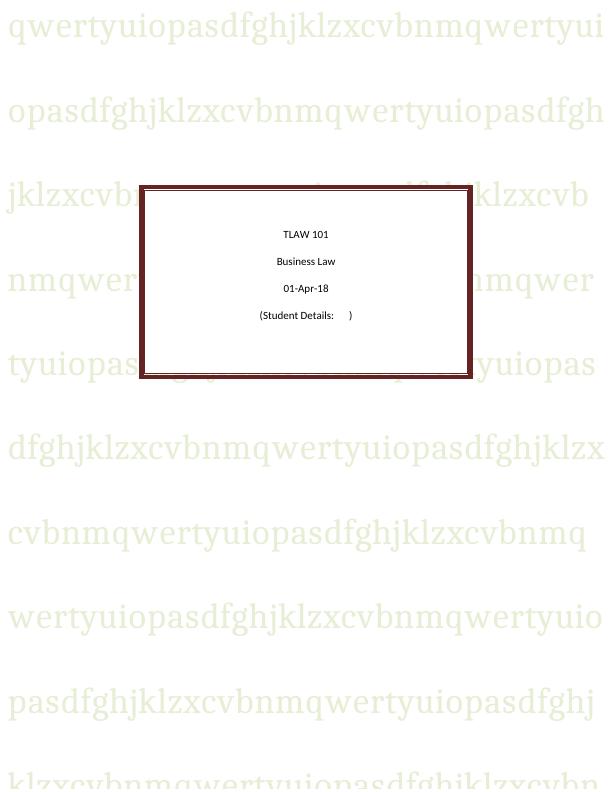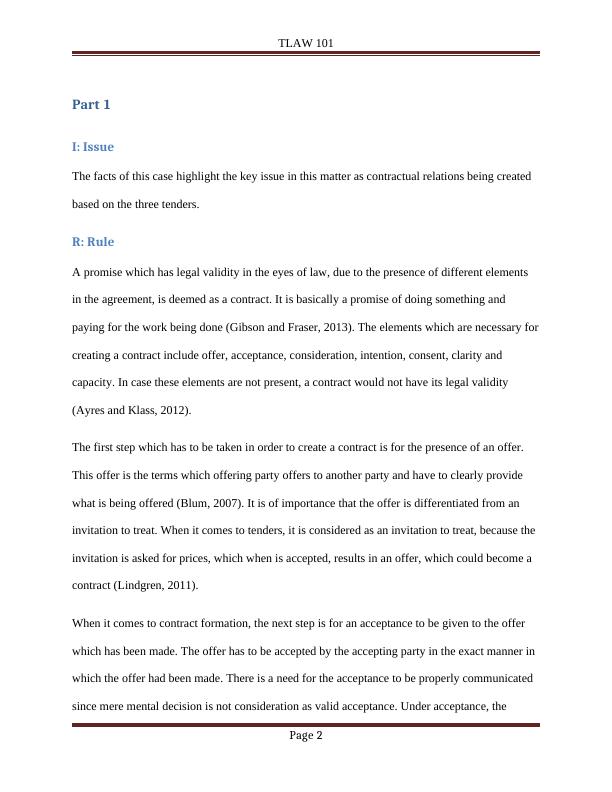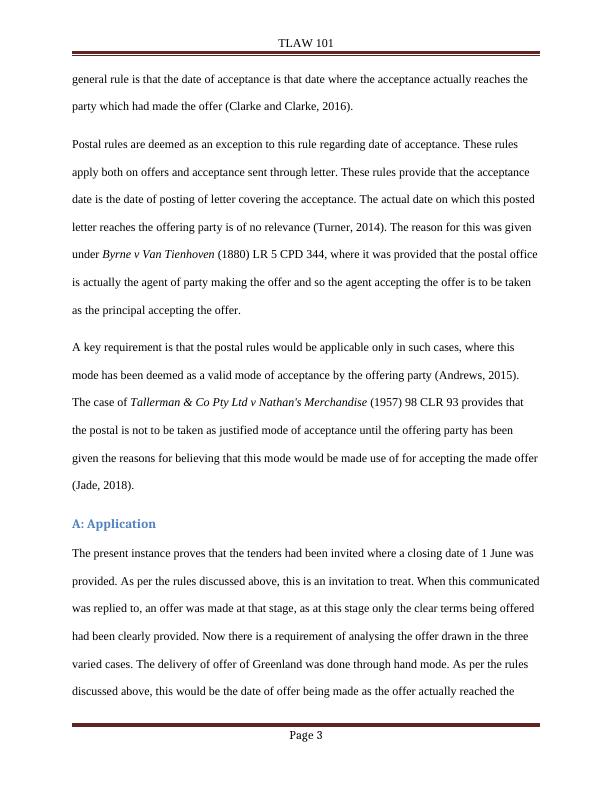Contract Formation and Legal Validity in Business Law
Added on 2023-06-13
9 Pages2019 Words207 Views
qwertyuiopasdfghjklzxcvbnmqwertyui
opasdfghjklzxcvbnmqwertyuiopasdfgh
jklzxcvbnmqwertyuiopasdfghjklzxcvb
nmqwertyuiopasdfghjklzxcvbnmqwer
tyuiopasdfghjklzxcvbnmqwertyuiopas
dfghjklzxcvbnmqwertyuiopasdfghjklzx
cvbnmqwertyuiopasdfghjklzxcvbnmq
wertyuiopasdfghjklzxcvbnmqwertyuio
pasdfghjklzxcvbnmqwertyuiopasdfghj
TLAW 101
Business Law
01-Apr-18
(Student Details: )
opasdfghjklzxcvbnmqwertyuiopasdfgh
jklzxcvbnmqwertyuiopasdfghjklzxcvb
nmqwertyuiopasdfghjklzxcvbnmqwer
tyuiopasdfghjklzxcvbnmqwertyuiopas
dfghjklzxcvbnmqwertyuiopasdfghjklzx
cvbnmqwertyuiopasdfghjklzxcvbnmq
wertyuiopasdfghjklzxcvbnmqwertyuio
pasdfghjklzxcvbnmqwertyuiopasdfghj
TLAW 101
Business Law
01-Apr-18
(Student Details: )

TLAW 101
Part 1
I: Issue
The facts of this case highlight the key issue in this matter as contractual relations being created
based on the three tenders.
R: Rule
A promise which has legal validity in the eyes of law, due to the presence of different elements
in the agreement, is deemed as a contract. It is basically a promise of doing something and
paying for the work being done (Gibson and Fraser, 2013). The elements which are necessary for
creating a contract include offer, acceptance, consideration, intention, consent, clarity and
capacity. In case these elements are not present, a contract would not have its legal validity
(Ayres and Klass, 2012).
The first step which has to be taken in order to create a contract is for the presence of an offer.
This offer is the terms which offering party offers to another party and have to clearly provide
what is being offered (Blum, 2007). It is of importance that the offer is differentiated from an
invitation to treat. When it comes to tenders, it is considered as an invitation to treat, because the
invitation is asked for prices, which when is accepted, results in an offer, which could become a
contract (Lindgren, 2011).
When it comes to contract formation, the next step is for an acceptance to be given to the offer
which has been made. The offer has to be accepted by the accepting party in the exact manner in
which the offer had been made. There is a need for the acceptance to be properly communicated
since mere mental decision is not consideration as valid acceptance. Under acceptance, the
Page 2
Part 1
I: Issue
The facts of this case highlight the key issue in this matter as contractual relations being created
based on the three tenders.
R: Rule
A promise which has legal validity in the eyes of law, due to the presence of different elements
in the agreement, is deemed as a contract. It is basically a promise of doing something and
paying for the work being done (Gibson and Fraser, 2013). The elements which are necessary for
creating a contract include offer, acceptance, consideration, intention, consent, clarity and
capacity. In case these elements are not present, a contract would not have its legal validity
(Ayres and Klass, 2012).
The first step which has to be taken in order to create a contract is for the presence of an offer.
This offer is the terms which offering party offers to another party and have to clearly provide
what is being offered (Blum, 2007). It is of importance that the offer is differentiated from an
invitation to treat. When it comes to tenders, it is considered as an invitation to treat, because the
invitation is asked for prices, which when is accepted, results in an offer, which could become a
contract (Lindgren, 2011).
When it comes to contract formation, the next step is for an acceptance to be given to the offer
which has been made. The offer has to be accepted by the accepting party in the exact manner in
which the offer had been made. There is a need for the acceptance to be properly communicated
since mere mental decision is not consideration as valid acceptance. Under acceptance, the
Page 2

TLAW 101
general rule is that the date of acceptance is that date where the acceptance actually reaches the
party which had made the offer (Clarke and Clarke, 2016).
Postal rules are deemed as an exception to this rule regarding date of acceptance. These rules
apply both on offers and acceptance sent through letter. These rules provide that the acceptance
date is the date of posting of letter covering the acceptance. The actual date on which this posted
letter reaches the offering party is of no relevance (Turner, 2014). The reason for this was given
under Byrne v Van Tienhoven (1880) LR 5 CPD 344, where it was provided that the postal office
is actually the agent of party making the offer and so the agent accepting the offer is to be taken
as the principal accepting the offer.
A key requirement is that the postal rules would be applicable only in such cases, where this
mode has been deemed as a valid mode of acceptance by the offering party (Andrews, 2015).
The case of Tallerman & Co Pty Ltd v Nathan's Merchandise (1957) 98 CLR 93 provides that
the postal is not to be taken as justified mode of acceptance until the offering party has been
given the reasons for believing that this mode would be made use of for accepting the made offer
(Jade, 2018).
A: Application
The present instance proves that the tenders had been invited where a closing date of 1 June was
provided. As per the rules discussed above, this is an invitation to treat. When this communicated
was replied to, an offer was made at that stage, as at this stage only the clear terms being offered
had been clearly provided. Now there is a requirement of analysing the offer drawn in the three
varied cases. The delivery of offer of Greenland was done through hand mode. As per the rules
discussed above, this would be the date of offer being made as the offer actually reached the
Page 3
general rule is that the date of acceptance is that date where the acceptance actually reaches the
party which had made the offer (Clarke and Clarke, 2016).
Postal rules are deemed as an exception to this rule regarding date of acceptance. These rules
apply both on offers and acceptance sent through letter. These rules provide that the acceptance
date is the date of posting of letter covering the acceptance. The actual date on which this posted
letter reaches the offering party is of no relevance (Turner, 2014). The reason for this was given
under Byrne v Van Tienhoven (1880) LR 5 CPD 344, where it was provided that the postal office
is actually the agent of party making the offer and so the agent accepting the offer is to be taken
as the principal accepting the offer.
A key requirement is that the postal rules would be applicable only in such cases, where this
mode has been deemed as a valid mode of acceptance by the offering party (Andrews, 2015).
The case of Tallerman & Co Pty Ltd v Nathan's Merchandise (1957) 98 CLR 93 provides that
the postal is not to be taken as justified mode of acceptance until the offering party has been
given the reasons for believing that this mode would be made use of for accepting the made offer
(Jade, 2018).
A: Application
The present instance proves that the tenders had been invited where a closing date of 1 June was
provided. As per the rules discussed above, this is an invitation to treat. When this communicated
was replied to, an offer was made at that stage, as at this stage only the clear terms being offered
had been clearly provided. Now there is a requirement of analysing the offer drawn in the three
varied cases. The delivery of offer of Greenland was done through hand mode. As per the rules
discussed above, this would be the date of offer being made as the offer actually reached the
Page 3

End of preview
Want to access all the pages? Upload your documents or become a member.
Related Documents
Contract Law: Elements of Agreement and Formation of Contractlg...
|7
|1575
|493
TLAW101 - Business Law Assignmentlg...
|9
|2035
|39
Business Law Assignment - Contract Formation and Communicationlg...
|9
|2034
|150
Aspects of Contract and Negligence for Businesslg...
|18
|4762
|242
BLO1105 Assignment on Business Lawlg...
|11
|2534
|146
Business Law Group Assignmentlg...
|15
|2499
|339
